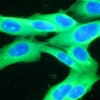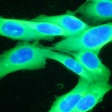
PathAI and Bristol Myers Squibb have agreed to extend their multi-year collaboration with the aim of expanding the use of artificial intelligence (AI) in the development of drugs to include translational research, clinical trials, and diagnostic improvements.
"We will build on our work using AI-based pathology in translational research and validate the use of this technology through clinical trials and diagnostic development," Andy Beck, cofounder and CEO of PathAI, said in a statement.
The two companies began their collaboration in 2016, emphasizing research on the use of AI to improve on manual methods of diagnosis. In June 2020, they presented findings that suggested that AI-powered programmed death ligand 1 (PD-L1) scoring could identify more positive PD-L1 patients compared to manual-based scoring.
Two years later, in July 2022, they published data in the Journal of Modern Pathology that compared manual immunohistochemistry (IHC) scoring PD-L1 expression obtained through multiple clinical trials to AI-powered algorithms accomplishing the same task.
With these past collaborations in mind, Bristol Myers Squibb and PathAI plan on using AI technology to further increase patient identification and treatment suggestions. They also plan on developing more precise and effective AI-powered diagnostics capable of predicting a patient's response to immunotherapy treatment.



















